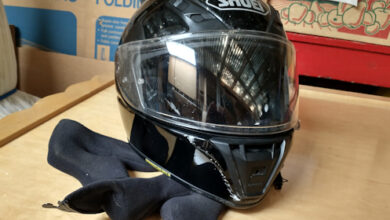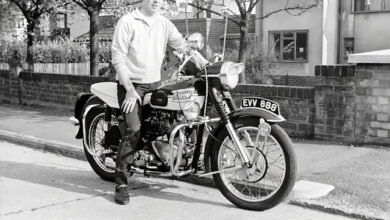When Is It Time to Stop Riding? A Deep Dive for Bikers

By Norman Gregory Fernandez, Esq.
The Biker Law Blog | https://bikerlawblog.com
Riding a motorcycle is more than a hobby—it’s a calling. But every journey has crossroads, and veteran riders eventually wonder: when is it time to stop? This isn’t just about age. Deciding to hang up the throttle involves age, physical capabilities, psychological readiness, and life circumstances.
In this post, I’ll explore each of these factors in detail. I’ll also build on my earlier article, “Should You Stop Riding Motorcycles When You Reach a Certain Age?”, where I shared observations from riders aging on the road. Link to Article.
🧓 Age: More Than Just a Number

When is it time to stop riding
Age sneaks up on all of us—especially in unexpected ways. It’s not the years, but how your body responds:
-
Declining reflexes and vision: Just like I noted before, “your senses and reflexes get worse with old age” bikerlawblog.com. Slowed reaction times can leave you vulnerable in fast-moving traffic.
-
Joint stiffness and reduced flexibility: Fitting into tight curves or handling a heavy bike demands physicality. As muscles and joints age, managing the bike becomes a chore.
-
Bone density loss and longer recovery times: A broken bone at 45 might heal in weeks. At 65? You’re looking at months—and higher risks from complications.
These physical signs don’t always show up every day. Sometimes only a gentle jog, an unexpected stiffness, or heartburn after a long ride whispers it’s time to reflect.
Tip
If you’re in your late 60s or 70s, consider getting your reflexes, vision, and flexibility professionally tested. An honest assessment can guide your decision—extending your ride or prompting a change.
🩺 Physical Ailments & Medical Conditions
Age often brings medical challenges that impact your riding:
-
Chronic pain (arthritis, back issues) can distract you mid-ride.
-
Neurological issues (e.g. seizures)—as discussed in “Should you ride with an illness?”—can be catastrophic. Link to article.
-
Cardiovascular problems might not give warning. A heart episode on a bike can be fatal.
-
Medications with side effects—like drowsiness from painkillers— directly impair judgment and coordination. Link to article.
These conditions demand regular conversations with your doctor. Just as I wrote about avoiding riding with a medical condition impairing your “100% sharp” abilities (link to article), you can’t safely ride with hidden impairment.
🧠 Psychological Readiness & Risk Perception
Mental health and mindset matter. Age often shifts priorities:
-
Confidence fade: After a spill or near-miss, some riders become overly cautious—or worse, hesitant—on the road.
-
Reduced motivation: Biking becomes more stressful than fun.
-
Anxiety and fear: A clean rider or family may insist you stop after an accident, even if you’re technically fine.
These mental barriers can distract you and slow your reactions. If your head isn’t fully in the ride, it may be time to park it—at least temporarily.
💡 Lifestyle & Life Changes
Your ride fits into your life. When that life changes, the ride may too:
-
Family and caregiving demands: If kids, spouses, or elderly parents count on you, consider the risk-to-benefit balance.
-
Retirement shifts: A high-mileage, long-distance ride may seem less appealing than a relaxing pastime.
-
Finances and insurance: As your premium rises or pension becomes tight, sustaining riding may strain resources.
It’s not just about ability. It’s about whether riding still belongs in your life stage.
🏍 Bike Type & Physical Demands
Not all bikes are created equal:
-
Heavy touring rigs: At low speeds, managing a 700 lb Harley is tough—even for healthy riders.
-
Sportbikes: Aggressive ergonomics demand flexibility and quick reflexes.
-
Lightweight bikes or trikes: Easier to handle—and can keep you on two wheels longer.
If your bike feels more burdensome than liberating, consider downsizing or switching to a trike or lighter model.
📚 Referencing “Too Old to Ride?”
Earlier, I asked: “Should You Stop Riding Motorcycles When You Reach A Certain Age?” Link to article. In that article, I stressed that age alone shouldn’t be the deciding factor—but sensory decline is real. Today I build upon that with broader factors—medical, mental, lifestyle, and physical demands—showing age as one element of a bigger picture.
The takeaway: there’s no universal cutoff. Some 80-year-olds ride temples around town. Others hang them up in their 50s. It’s deeply personal—and practical.
✅ A Checklist Before You Decide
Ask yourself these questions:
| Question | Why It Matters |
|---|---|
| 1. Have I noticed slower reflexes or blurred vision? | These delay response in traffic. |
| 2. Do I have chronic conditions or meds causing drowsiness/dizziness? | Hidden impairment is deadly. |
| 3. Have near-misses made me nervous or hesitant? | Anxiety kills focus. |
| 4. Is riding limiting time with loved ones or stretching my budget? | Balance your risks and rewards. |
| 5. Is my bike too heavy or physically demanding now? | No need to torture yourself. |
If you answered “yes” to any, it’s a sign to rethink your ride.
📌 What You Can Do
A. Modify your ride
Shift to lighter bikes, trikes, or electric scooters. Outfit your ride with better lighting, easier ergonomics, or stability systems.
B. Ride smarter
Stick to daytime hours, short rides, and low-traffic roads. Avoid highways and risky conditions.
C. Evaluate regularly
Get eye exams, physicals, and cognitive testing. Stay honest with yourself—and with your doctor.
D. Enjoy bike-adjacent alternatives
Volunteer, mentor younger riders, write blogs, join riding clubs. Your passion doesn’t need rubber on the road.
Final Thoughts from Norman Gregory Fernandez
Riding is freedom—when your mind, body, and lifestyle are in harmony. But when those elements shift, enjoying the ride means making choices, not chasing past glory.
Age is just one piece of the puzzle. More important is your physical safety, mental clarity, and wellbeing—plus what life demands of you now. Listen to your body. Talk to your doctor. Have hard conversations with family. And if you do decide to ride on—ride smart, ride safe, and ride your best.
If you, a loved one, or a riding brother/sister have been injured in a crash, I’m here to help. Drop me a line at https://thepersonalinjury.com or right here on Biker Law Blog. This is your ride—and your choice. Make it count.
Footnote: For more on age and riding, check out my earlier article: “Should You Stop Riding Motorcycles When You Reach a Certain Age?” bikerlawblog.com
Ride smart. Ride safe. Ride with purpose.
— Norman Gregory Fernandez, Esq.
Founder, The Biker Law Blog
California Motorcycle Accident Attorney & Biker
🌐 www.thepersonalinjury.com
#BikerLawBlog #NormanGregoryFernandez #MotorcycleSafety #TooOldToRide #RideSmart #BikerLife #MotorcycleLawyer #CaliforniaBikerAttorney #MotorcycleInjuryLawyer #TwoWheelsForever #MotorcycleHealth #SeniorRiders #TrikeLife #KeepRidingOrQuit



